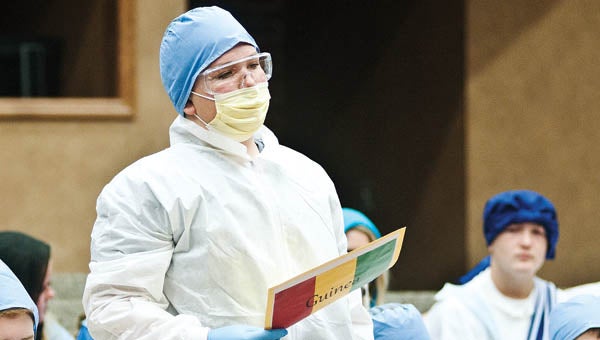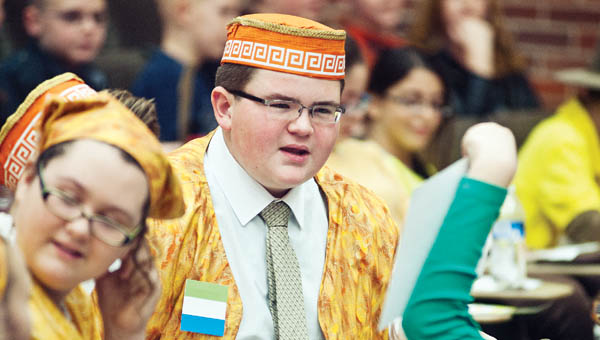Going global: Model UN students argue for, against resolutions
Published 10:55 am Friday, November 21, 2014

THE TRIBUNE/JESSICA ST JAMES
Luke Malone, with Rock Hill Middle School, portrays an Ebola doctors from Guinea during the Model United Nations event Thursday at Ohio University Southern.
If the seventh- and eighth-graders from Lawrence County dictated international policy, the air strikes in Syria won’t stop anytime soon.
South Point students representing Syria brought a resolution before the Lawrence County Model United Nations on Thursday in the Bowman Auditorium at Ohio University Southern, asking all UN nations participating in anti-ISIS air strikes to cease bombing.
“If the air strikes stop, what’s Syria’s plan to fight ISIS” Luke Malone, from Rock Hill Middle School and delegate from Guinea, asked, to which Syrian delegate Sara Allen answered, “we would involve the military if needed, but we prefer a peaceful resolution.”
Jasmine Lander, a representative from the United Kingdom’s delegation, comprised of Rock Hill Middle School students, questioned Syria’s ability to adequately defend itself against ISIS. Fairland Middle School’s Scotty Ferrell offered the Czech Republic’s argument for the resolution as did a delegate from Burundi, but after two delegates from Sierra Leone offered arguments against the resolution, it ultimately failed by a 7-5 vote. Burundi abstained from voting because of failure to reach a consensus.
A resolution presented by the delegation from France, comprised of South Point students, also failed.
French delegate E.J. Daniels’ argued that vehicle emissions were increasing nitrogen dioxide levels in the air and harming French citizens. His request for three buses and five electric cars from UN member nations failed to gain approval.
After fielding questions from delegates from Sierra Leone, Burundi and the United Kingdom and hearing arguments for and against, the resolution failed 8-4.

THE TRIBUNE/JESSICA ST JAMES
Adam Fleeman, from Rock Hill Middle School, representing Sierra Leone, discusses the purposes of electric cars with delegates representing France.
The United Kingdom argued against the resolution because, according to Lander, France manufactures a large number of the world’s electric cars and therefore does not need UN aid for the importation of electric cars.
“We may be the largest manufacturer,” Daniels said, “but it’s still not that many.”
In other action at the Model UN, Afghanistan (Dawson-Bryant Middle School) presented a resolution to improve the country’s literacy rate; Australia (Rock Hill) asked for bee hives to help increase honey production; the Bahamas (Fairland) requested financial aid to build sanctuaries to protect endangered species; and Burundi (Fairland) took on a growing problem by presenting a resolution addressing human trafficking and forced labor.
The Czech Republic, United Kingdom, Somalia (Dawson-Bryant) and the Ukraine (Symmes Valley) also presented resolutions.
Model UN is an educational simulation and academic competition in which students learn about diplomacy, international relations and the United Nations. Model UN involves and teaches research, public speaking, debating and writing skills in addition to critical thinking, teamwork and leadership abilities.
Participants in Model UN conferences, referred to as delegates, are placed in committees and assigned countries, or occasionally other organizations or political figures, to represent. They are presented with their assignments in advance, along with a topic or topics that their committee will discuss. Delegates conduct research before conferences and formulate positions they will then debate with their fellow delegates in committee. At the end of a conference, the best-performing delegates in each committee are sometimes recognized with awards.





